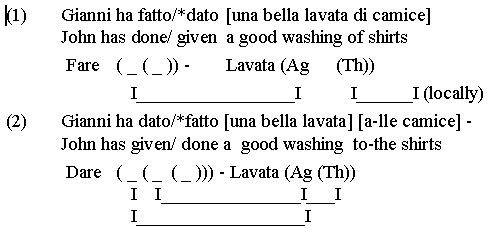
Donnerstag, 9.00 Uhr
This work examines the syntax-semantics interface of complex predicates built by Italian deverbal nominalizations in -ata with light verbs fare 'to do' and dare 'to give'. In particular, it investigates the actual status of the argument-structure (henceforth 'a-structure') of the combining items, the motivation being that the status of the participating a-structures restricts the range of conceivable relations among them, and this relation lies at the core of thematic-based accounts of complex predicates.
First, I will examine Italian ata-nominalizations, which appear to escape suppression of the external argument of the verb they are based on, witness (i) the existence of ata-nominalizations based on ergative verbs, against what expected if suppression were mandatory, and (ii) the possibility, in complex predicate constructions, of merging only the external argument, whereas suppression of the external role would require merging of at least one more additional role (Grimshaw, 1990:112). My goal is to establish whether the external role is suppressed or not, and see how this can be reconciled with the many syntactic properties that relate to the argument structure of the lower predicate, as discussed in Rosen (1989), Grimshaw (1990) and similar works on complex predicates.
Second, I will consider the thematic structure contributed by the light verb. This issue has been at the center of the debate concerning thematic approaches to complex predicates. For example, Butt (1995) argues for the "bleaching" of a-structure, retaining the argumental slots but not the roles themselves, whereas Grimshaw and Mester (1988) argue for a fully empty a-structure. I will provide evidence in favour of Butt's perspective, showing that ata-nominalizations select for light verbs with more or less argumental slots on the base of the number of thematic roles they need to merge. Such selection can only occur if the argumental slots of the light verb are accessible.
Consider for example (1) and (2) below, involving the nominalization lavata 'washing', which inherits the a-structure <Ag, Th> from the base lavare 'to wash' (I am here temporarily assuming that the external argument is not suppressed). In (1), only the agent is merged, since the theme is introduced by di 'of', the preposition for the complements of nouns, and is thus realized within the NP headed by the nominalization. Consequently, the selected light verb is fare, whose first slot is merged with the agent role, and its second possibly with the referential role of the nominalization. In (2), on the other hand, both the agent and the theme merge, since the theme occurs introduced by a 'to', the preposition introducing the indirect object of the verb dare. Correspondingly, the selected light verb is dare, because it can provide the needed additional argumental slot.

Additional evidence will consider ata-nominalizations with different bases, showing that fare is selected when the base is monoargumental, and dare when it is transitive or ditransitive. Here too the number of available argumental slots determines which light verb occurs in each case.
Overall, the investigation of the specific properties of this new instance of complex predicates will further constrain our accounts of the universal role played by a-structure in complex predicate constructions.
References:
Butt, M. 1995. The Structures of Complex Predicates in Urdu. Dissertations in Linguistics. Stanford: CSLI.
Grimshaw, J. 1990. Argument Structure. LI-Monograph. Cambridge: MIT-Press.
Grimshaw, J. and A. Mester 1988. Light Verbs and Theta-Marking. Linguistic Inquiry 19:205-232.
Rosen, S. 1989. Argument Structure and Complex Predicates. Doctoral dissertation, Brandeis University.
zum Programm der AG 7
zur alphabetischen ‹bersicht der Abstracts
zur zeitlichen ‹bersicht